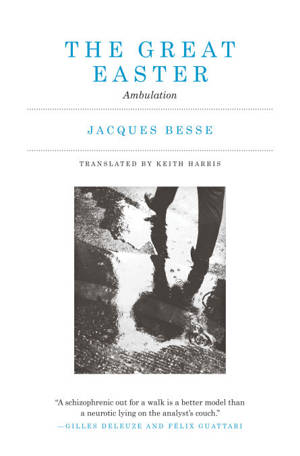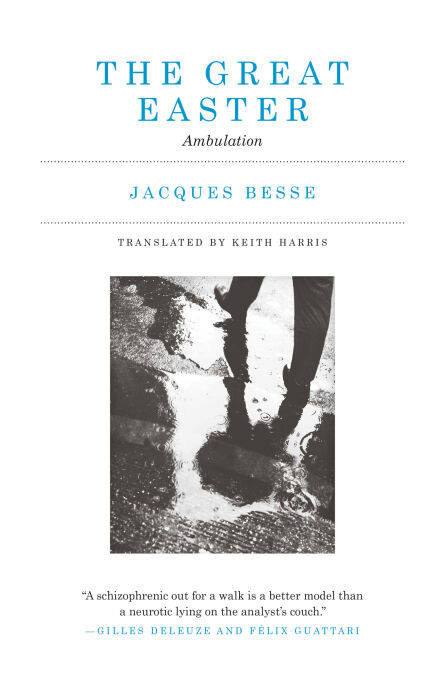
Bedankt voor het vertrouwen het afgelopen jaar! Om jou te bedanken bieden we GRATIS verzending (in België) aan op alles gedurende de hele maand januari.
- Afhalen na 1 uur in een winkel met voorraad
- In januari gratis thuislevering in België
- Ruim aanbod met 7 miljoen producten
Bedankt voor het vertrouwen het afgelopen jaar! Om jou te bedanken bieden we GRATIS verzending (in België) aan op alles gedurende de hele maand januari.
- Afhalen na 1 uur in een winkel met voorraad
- In januari gratis thuislevering in België
- Ruim aanbod met 7 miljoen producten
Zoeken
Omschrijving
A hallucinating, insomniac, and increasingly fragile flaneur wanders the streets of Paris over the long Easter weekend of 1960.
Paris, Easter weekend 1960. The French composer Jacques Besse sets out on a marathon stroll through the city that begins on Good Friday, when he leaves his brother’s house on rue de Turbigo, and ends on Easter Monday, when, having declared himself Mars, the god of war, to mystified restaurant-goers, he ambles back toward Saint-Germain-des-Prés. The Great Easter—a memoir in the form of a novella, or perhaps a novella in the form of a memoir—is the first-person account of a hallucinating, insomniac, and increasingly fragile flaneur’s unending ambulation.
The Great Easter was first published in French in 1969 and became famous a few years later when in their milestone work Anti-Oedipus Gilles Deleuze and Félix Guattari referred to Besse’s walk as the quintessential “double stroll of the schizo.” (Besse was a patient at Guattari’s psychiatric clinic La Borde.) Besse’s stroll purées past and present, real and not-real: a rendezvous with a prostitute intersects with Sergei Eisenstein and his entourage, a bellowed song about the sea is overwhelmed by “memories” of the 1830 July Revolution, and the entire universe gathers itself up into a bubble above Gare d’Austerlitz. He is seized by anxiety, released by joy; he announces his cosmic celebrity via a huge (imaginary) television while freezing in the night and calling out for bread. A cult favorite in France, The Great Easter is an engrossing, surreal road movie of a book.
Paris, Easter weekend 1960. The French composer Jacques Besse sets out on a marathon stroll through the city that begins on Good Friday, when he leaves his brother’s house on rue de Turbigo, and ends on Easter Monday, when, having declared himself Mars, the god of war, to mystified restaurant-goers, he ambles back toward Saint-Germain-des-Prés. The Great Easter—a memoir in the form of a novella, or perhaps a novella in the form of a memoir—is the first-person account of a hallucinating, insomniac, and increasingly fragile flaneur’s unending ambulation.
The Great Easter was first published in French in 1969 and became famous a few years later when in their milestone work Anti-Oedipus Gilles Deleuze and Félix Guattari referred to Besse’s walk as the quintessential “double stroll of the schizo.” (Besse was a patient at Guattari’s psychiatric clinic La Borde.) Besse’s stroll purées past and present, real and not-real: a rendezvous with a prostitute intersects with Sergei Eisenstein and his entourage, a bellowed song about the sea is overwhelmed by “memories” of the 1830 July Revolution, and the entire universe gathers itself up into a bubble above Gare d’Austerlitz. He is seized by anxiety, released by joy; he announces his cosmic celebrity via a huge (imaginary) television while freezing in the night and calling out for bread. A cult favorite in France, The Great Easter is an engrossing, surreal road movie of a book.
Specificaties
Betrokkenen
- Auteur(s):
- Vertaler(s):
- Uitgeverij:
Inhoud
- Aantal bladzijden:
- 112
- Taal:
- Engels
Eigenschappen
- Productcode (EAN):
- 9780262370578
- Verschijningsdatum:
- 12/09/2022
- Uitvoering:
- E-book
- Beveiligd met:
- Adobe DRM
- Formaat:
- ePub

Alleen bij Standaard Boekhandel
+ 19 punten op je klantenkaart van Standaard Boekhandel
Beoordelingen
We publiceren alleen reviews die voldoen aan de voorwaarden voor reviews. Bekijk onze voorwaarden voor reviews.









